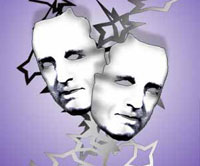Political correctness often borders on hypocrisy
Political correctness is a fairly new invention. The seemingly innocuous term “political correctness” is thought to have originated in American university campuses. Its popularity peaked in Western society in the 1990s. Some academics supported the Sapir-Whorf hypothesis, which states that a language’s grammatical categories shape its speaker’s ideas and actions. Basically, a person is supposed to keep his thoughts in order by steering clear of certain expressions that cause offence to members of identity groups around issues of gender, race or age.

The goal seems quite praiseworthy. However, substitutes for the “improper” words had to be coined. The practice of using “inclusive” or “neutral” language (subsequently described by the term “political correctness”) aims to minimize offence to racial, cultural or other identity groups.
Democracy breeds political correctness
There are, without doubt, a number of reasons behind the spread of political correctness. However, its use is confined to democratic communities. Two factors probably played a part in the spread of political correctness.
First, assorted individuals that make up a democratic community should be seen as having equal rights, opportunities or freedoms. Second, the man in the street is rather reluctant to delve into the subtleties pertaining to representatives of numerous ethnic, religious and cultural groups as he glances at a motley crowd of people in a big city. Therefore, we tend to choose an overly simplified way of thinking of other people. In other words, we normally stereotype those who do not belong to our social class, race, religion etc. For instance, some of us see a homosexual as an effeminate geek; a Jew as a miser, and a Negro as a pusher and so on. Others may believe that an Arab and his numerous next of kin usually do nothing but enjoy the benefits of a welfare state.
On the one hand, you can save up lots of time by sticking to stereotypes. On the other hand, you are likely to take the consequences if you reveal your physical or mental of handicap to members of a community that has certain stereotypes of the disabled or mentally ill.
Unmentionable subjects
There is yet another viewpoint. Certain things and phenomena have been considered unmentionable from time immemorial. To name them, folks came up with a few euphemisms in days of old. There were special terms in primitive cultures for referring to wild animals being hunted or chased. The logic was grounded in simple reasoning: a deer will run away the moment you call him by the name.
The same applies to traditional beliefs and legends featuring the evil one and demons. It was widely believed that demonic creatures could not but do harm to people who dare mention their names far too often. To beonthe safe side, it is best to categorize Old Nick and all the gremlins, fiends and bad fairies as the “unclean.”
Other kinds of euphemisms had to do with a variety of social norms and restrictions imposed by society. For instance, a female member of high society was supposed “to use her handkerchief” in lieu of “blowing her nose”. She would have been considered a person with the lack of finesses in taste and manners had she opted to do it otherwise. To some extent, Aesopian language, which was actively used in totalitarian societies, is a kind of euphemism as well.
Another characteristic linking euphemism to political correctness is worth mentioning. The usage of euphemistic words and expressions always stems from some fear or foreboding. Likewise, political correctness rests on fear too. We have a fear of those who differ from us in the way they look, speak, pray etc. We are scared of strangers whose ethnic, social or cultural differences make them unfit for our society. University professors were right to conclude that the kind of language we use does reflect the ways in which we see the world even when want to cover them up.
An optical illusion
Let us briefly get back to reasons behind the emergence of political correctness. It is thought that the use of the so-called non-offensive language (more acceptable descriptors) can enable us to attribute less importance to certain characteristics of an identity group which we find questionable. Similarly, the practice is thought to enable members of an identity group to forgive us for putting special emphasis on differences between us. However, it is still unclear what sort of rights a deaf person is entitled to receive once he is referred to as a “hearing-impaired person.” Is he going to enjoy some new civil rights or the right of election? No wonder many people are now starting to see political correctness as hypocrisy in disguise.
A severely shortsighted person is likely to see the world in a blur once he takes off his glasses. A similar effect is caused by political correctness. “A clash between armed group” – what does this euphemistic phrase stand for? In plain language, it means war. Those who fail to describe things in a clear-cut way must be having similar difficulties when it comes to their mental powers concerned with forming conclusions and judgments. Secondly, many tend to overdo it when trying to be overly polite and nice to everyone. The desire is ostensibly good yet often out of bounds. It stands to reason that critics point out hypocrisy as being part of political correctness, which implies censorship and endangers free speech. Smoothing over certain irregularities or difficulties does not necessarily mean a fight against xenophobia.
Medportal
Translated by Guerman Grachev
Pravda.ru
Subscribe to Pravda.Ru Telegram channel, Facebook, RSS!


